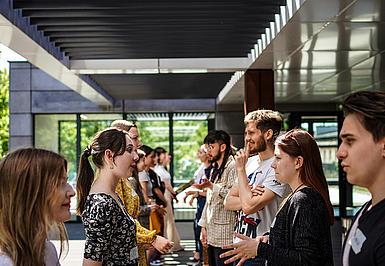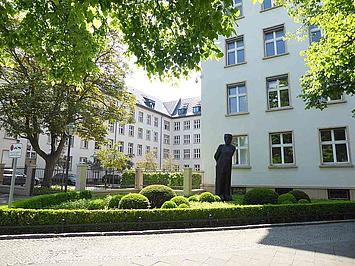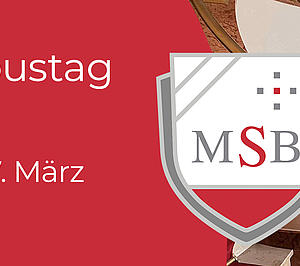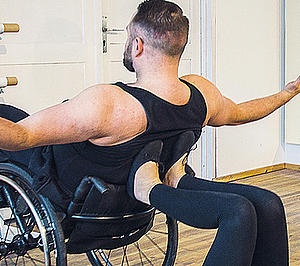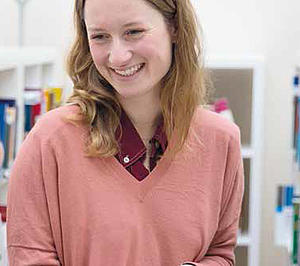Empowering Communities Through Compassionate Action
Social work stands for responsibility. It consistently promotes individual well-being and the participation of people in society. As a human rights profession, it strengthens self-determination and self-efficacy, promotes the health integrity of disadvantaged people, ensures the social cohesion of the community, fights against poverty, and advocates for social justice in society.
Well-qualified specialists who are professionally capable of organizing sustainable conditions for effective social work in an assertive and level-headed manner are needed in all areas of social and health care. In short, strong personalities who want to take on leadership responsibility for social work in society in the future are in demand.
In line with the international orientation of the Master’s program in Social Work and the requirements for professional integration into the German-speaking social sector, students are required to provide proof of German language proficiency at the C1 level of the Common European Framework of Reference for Languages (CEFR) before completing their final semester. The Career Center at Medical School Berlin offers optional language courses for a fee, ranging from A1 to C1 level of the Common European Framework of Reference for Languages (CEFR), to support students in gradually building their language skills up to the required proficiency level.
The program corresponds to the state-recognized Master’s degree in Social Work and is conducted in English. Notifications of changes are currently being processed by the Senate Administration and the Accreditation Council.
Semester Start Date
1st October
Study Model/Duration
Full-Time/4 semesters
Tuition Fees
550€ / month
Enrollment Fee
100€, non-recurrent
Degree
Master of Arts (University of Applied Sciences degree)
Areas of application
Socio-medical rehabilitation hospitals, Counseling centers, Youth welfare services, Public health service
Study content
The accredited and state-recognized Master's degree program in Social Work (M.A.) offers students a modern and stimulating learning environment designed by proven academics and practitioners. In addition to the theoretical modules of the academic disciplines, the lecturers provide precise and well-founded information on how research methods are used to determine needs and what support is appropriate for the various forms of disadvantage and stress in the many areas of social work.
As a student of the Master's program in Social Work, you will be able to analyze problems, conflicts, and crises in a self-confident and self-conscious way and to develop sustainable solutions for individuals, institutions, or the social space of an urban area. You will learn to plan specific assistance and to know how this is financed, implemented, and finally evaluated. You will be able to analyze and further develop complex issues with suitable research designs. You will have a comprehensive and well-founded knowledge base, identify mental disorders in children, adolescents, and adults, and derive appropriate interventions from them.
Program content
One focus of the degree program is on providing in-depth knowledge in the areas of psychosocial counseling and developmental support as well as target group-specific intervention in the context of social psychiatric and social medical care. In particular you learn systemic and solution-oriented approaches and counseling methods, which qualify you for work in counseling centers, but are also fundamental for your communication skills as a social manager. In addition to systemic competences, students acquire explicit knowledge of psychodynamic-interactional pedagogy.
Study flexibly?
With the modern concept of blended learning, a sensible mix of face-to-face study in classrooms, virtual teaching, and self-study, you can study at Campus Berlin as well as at your personal favorite place of learning. Because our standard of quality is that a Social Work degree program must have both. Without attendance, students cannot be professionally supervised, and content cannot be taught in a methodologically diverse way. Group dialogue and self-confident exercises must be experienced and reflected on campus. This is the only way to learn to work with people for people. Social skills must be taught socially in a natural social environment.
However, according to today's standards of teaching, quality also means integrating virtual teaching formats in a didactically meaningful way into your studies. At MSB, you study according to a reliable, clearly structured timetable with flexible components of face-to-face teaching in classrooms, online teaching, and guided self-study. Each teaching format is interrelated and follows a stringent common thread with comprehensible learning objectives. At MSB, virtual learning means developing your own learning style under guidance and training it as a learning strategy in order to achieve a goal-oriented conclusion.
Reconciling work and study?
For a good theory-practice transfer, we encourage you to work in a social organization during your studies. Although you are a full-time student, you only have to study three days a week. In addition, during the so-called attendance week, you only visit campus once a month. For the remaining three weeks of the month, you study virtually at your favorite learning location. In short: you have the best opportunities to work alongside your studies and to choose your learning locations individually.
Career opportunities
The number of vacancies in social work is enormous. Many vacancies remain unfilled because the number of university graduates does not match the needs of the labor market. Both public, independent, and church organizations and institutions are constantly looking for well-trained professionals for basic work and management positions.
On the basis of current developments, this already high demand is expected to increase further. This applies in particular to social workers with a master's degree, as they fulfill the specific practical fields of social work with empirical knowledge, methodological expertise, competences in quality management, and knowledge of the health care system and social systems.
The Master's degree program qualifies graduates for activities in the following areas:
- Counseling Centers
- Youth services and social services
- Inpatient child and youth welfare facilities
- Penal system
- Public health service
- Social-medical rehabilitation
- Hospitals
- Schools and daycare centers
- Family Centers
- Coordination and planning centers (e.g., social planning)
- Political posts
- Administrative bodies at the federal, state, and municipal levels
- Training and further education
- Research projects
- Universities
Admission requirements at a glance
- Authorization to study in Master's degree programs according to § 10 BerlHG
- First professionally qualifying university degree (diploma, bachelor) in Social Work, Social Pedagogy, Special Education, Transdisciplinary Early Intervention, or a comparable degree program.
The degree program at MSB is NC-free (Numerus Clausus free). Following your application, we will assess your personal motivation in an individual admissions interview.


